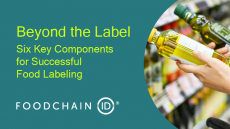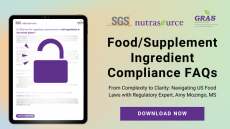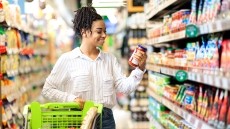Tractor Beverage Co. gets granular on organic farming metrics with sustainability tracker
The launch of the tracker comes as consumers are looking for more transparency into the entire food and beverage supply chain and increased interest in organic products. In a survey of 1,093 US consumers, Tractor Beverage found 63% of consumers were concerned about synthetic pesticides in their food supply, and 50% said organic products are safer.
"We really wanted to develop metrics that allowed us to communicate what synthetic pesticides do and what organic farming is," Herber said.
Partnering with HowGood to deliver sustainability metrics
Through a partnership with research and data platform company HowGood, the brand created the Organic Impact Tracker, allowing consumers to see sustainability metrics for several of its beverages on the brand's website.
The tracker currently shows that Tractor Beverage's lemonade, which is formulated with all-natural sugar cane and turmeric, has avoided 4.0 tons of synthetic pesticides and 44.2 tons of carbon emissions, supported 5.3 acres of organic land, saved 284.3 gallons of water, and improved the soil health of 5.3 acres of land.
HowGood and Tractor Beverage created these metrics by taking “a really deep dive into all the ingredients that Tractor Beverage uses in their beverage formulations,” said Stephanie Bledsoe, research agronomist with LandBack Ag, who led development of the synthetic pesticides-avoided metric.
By examining the average amount of pesticides used to grow a crop and its actual yield, Bledsoe created a measurement that determined the amount of pesticides used to grow the ingredients used in beverage formulations. Since Tractor Beverage crops are grown without synthetic pesticides, it could use that measurement to see how much synthetic pesticides it avoided in beverage production.
Tips for creating sustainability within a brand
While the Organic Impact Tracker is one way brands can communicate sustainability metrics to their customer, João Brites, director of growth and innovation for HowGood, highlighted three key elements brands should consider as they look to data to tell a story around sustainability: traceability, transparency, and alignment to the Green Guides from the Federal Trade Commission.
First, brands should be transparent with their consumers on the source of the ingredients and the production practices used to create them, Brites said. Additionally, consumers need to "understand the metric in the way that the metric was intended," the methodology, and the data sources used, he said.
Lastly, FTC's Guides for the Use of Environmental Marketing claims, aka Green Guides, are crucial to back up green claims in the market, he added.
“The Federal Trade Commission has issued guidance on Green Guides [on] how companies should substantiate green claims, and that's really a very important source of guidance when brands like Tractor are going into the market … to make sure that the claims are not misleading, and that they really reward the brands that are doing the most in the marketplace for sustainability.”
FTC currently is reviewing the 'Green Guides' to address evolutions in company commitments to environmental, social and governance goals over the past ten years.

















